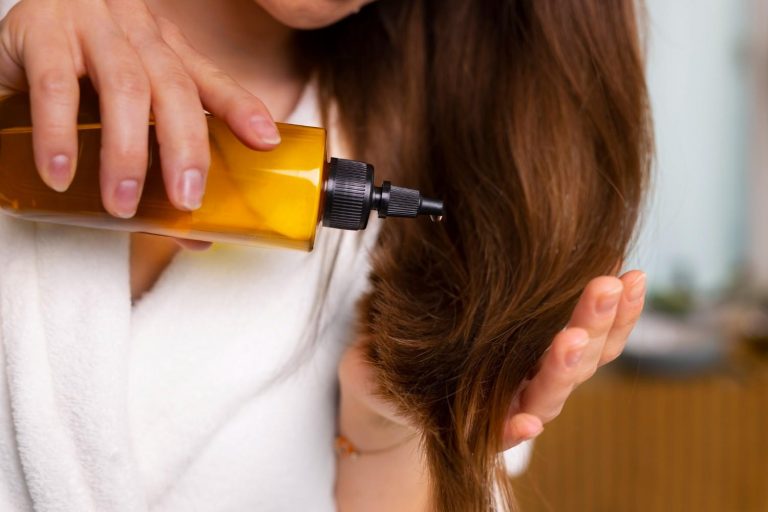Did you know that hair loss affects nearly 40% of women by the age of 40? It’s a reality many of us face, and it can be frustrating. Whether due to hormonal changes, stress, or just plain genetics, thinning hair can feel like an uphill battle. But what if I told you that some natural oils could help you regain that luscious mane? Let’s dive into five oils that might just be your hair’s new best friends.
Contents
1. Castor Oil
The Benefits
Castor oil has been a go-to remedy for hair growth for centuries. It’s rich in ricinoleic acid, which is known to improve circulation to the scalp. This increased blood flow can stimulate hair follicles, promoting growth. Plus, castor oil has antifungal properties, which can help keep the scalp healthy and free from infections that might hinder hair growth.
How to Use It
To incorporate castor oil into your routine, consider a scalp massage. Warm a tablespoon of castor oil and gently massage it into your scalp for about 10-15 minutes. Leave it on for at least an hour (or overnight if you’re feeling adventurous) before washing it out with shampoo.
Pros and Cons
While castor oil is generally safe, some people might experience allergic reactions. Always do a patch test before applying it to your scalp. Additionally, it can be thick and sticky, which might make washing it out a bit of a hassle.
2. Rosemary Oil
The Benefits
Rosemary oil is not just a delicious herb for your kitchen; it’s also been shown to promote hair growth. A study published in the journal Skinmed in 2015 found that rosemary oil was as effective as minoxidil (a common hair regrowth treatment) in increasing hair count after six months of use. Its ability to stimulate blood circulation and its antioxidant properties make it a powerhouse for hair health.
How to Use It
Mix a few drops of rosemary oil with a carrier oil like coconut or jojoba oil. Apply it to your scalp and leave it on for at least 30 minutes before shampooing. You can also add a few drops to your regular shampoo for a daily boost.
Pros and Cons
Rosemary oil is generally safe for most people, but it can cause irritation in some. If you have sensitive skin, start with a diluted version and monitor how your scalp reacts.
3. Peppermint Oil
The Benefits
Peppermint oil has a refreshing scent and a cooling sensation that many find invigorating. Its effectiveness in promoting hair growth is backed by a study published in the Toxicological Research journal in 2014. The study showed that peppermint oil significantly increased the number of hair follicles and hair growth in mice. While research on humans is still limited, the anecdotal evidence is strong.
How to Use It
Dilute peppermint oil with a carrier oil and massage it into your scalp. You can also add it to your conditioner for a refreshing wash. A little goes a long way, so just a few drops mixed in should do the trick.
Pros and Cons
The minty aroma is a perk, but it can also be too strong for some. If you experience any burning or discomfort, wash it out immediately and dilute further next time.
4. Coconut Oil
The Benefits
Coconut oil isn’t just a kitchen staple; it’s also a fantastic moisturizer for hair. Its unique fatty acid composition allows it to penetrate the hair shaft more effectively than many other oils, reducing protein loss and preventing damage. This means healthier hair that’s less likely to break.
How to Use It
For deep conditioning, warm up some coconut oil and apply it generously to your hair, focusing on the ends. Leave it on for at least an hour or overnight before washing it out. This can also help with frizz and give your hair a shiny appearance.
Pros and Cons
While coconut oil works wonders for many, it can weigh down fine hair. If you find your hair feels greasy or heavy after using it, try using it less frequently or in smaller amounts.
5. Jojoba Oil
The Benefits
Jojoba oil is unique because its composition closely resembles the natural oils produced by our skin and scalp. This means it can help balance oil production, making it excellent for both dry and oily scalps. It’s also packed with vitamins and minerals that nourish hair follicles, promoting healthy growth.
How to Use It
Apply jojoba oil directly to your scalp and hair. You can use it as a leave-in conditioner or mix it with other oils for a customized blend. It’s light enough that you can use it daily without weighing your hair down.
Pros and Cons
Jojoba oil is generally safe and non-irritating, but like any oil, it’s essential to monitor your scalp’s reaction. It can be a bit more expensive than other oils, but a little goes a long way.
FAQs
1. How often should I use these oils for best results?
Most experts suggest using these oils 2-3 times a week. Consistency is key, so find a routine that works for you.
2. Can I mix these oils together?
Absolutely! Many people find that creating a blend of oils can enhance their benefits. Just be sure to dilute essential oils like rosemary and peppermint properly.
3. Will these oils work for everyone?
While many people experience positive results, individual responses can vary. Factors like genetics, diet, and overall health play a significant role in hair growth.
4. Are there any side effects to using these oils?
Most natural oils are safe, but some individuals may experience allergic reactions or scalp irritation. Always do a patch test before full application.
Conclusion
Finding the right solution for hair growth can feel overwhelming, but incorporating natural oils like castor, rosemary, peppermint, coconut, and jojoba into your routine can make a difference. It’s not just about slapping on some oil; it’s about nurturing your scalp and hair with love and care. Remember, results take time, so be patient and consistent.
As you explore these options, always listen to your body and adjust your routine as needed. Hair growth is a journey, and with some natural support, you might just find the path to a fuller head of hair more manageable.
And let’s be real: while these oils can work wonders, they’re not magic potions. Always consult with a healthcare provider if you have concerns about hair loss or if you’re considering a new treatment plan.
Disclaimer: This article is for educational purposes only and is not a substitute for professional medical advice. Always consult a qualified healthcare provider before making changes to your health routine.
References
- Panahi, Y., Mohammadi, H., & Sahebkar, A. (2015). The effect of rosemary oil on hair growth in mice. Skinmed, 13(3), 178-182. Retrieved from https://www.skinmedjournal.com
- Lee, S. Y., & Kim, H. J. (2014). The effect of peppermint oil on hair growth in mice. Toxicological Research, 30(2), 113-119. Retrieved from https://www.e-trd.org
- Jagannathan, S., & Shankar, S. (2020). Coconut oil: A review of its health benefits. Journal of Health and Allied Sciences, 10(2), 45-50. Retrieved from https://www.jhas.org
Get Your FREE Natural Health Guide!
Subscribe now and receive our exclusive ebook packed with natural health tips, practical wellness advice, and easy lifestyle changes, delivered straight to your inbox.




